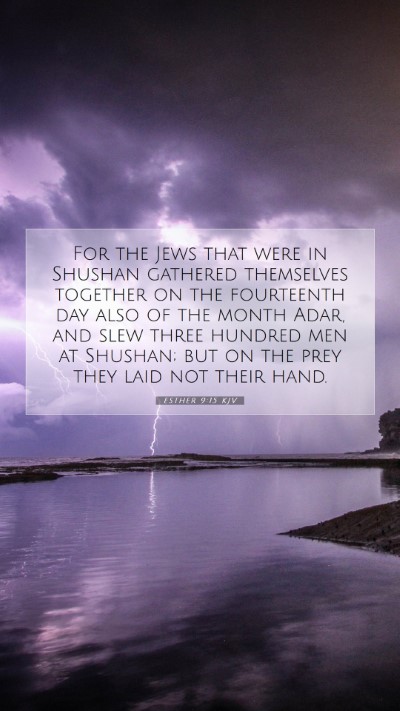Understanding Esther 9:15
Esther 9:15 reads: "For the Jews that were in Shushan gathered themselves together on the fourteenth day also of the month Adar, and slew three hundred men at Shushan; but the rest of the Jews in the king's provinces gathered themselves together, and stood for their lives, and had rest from their enemies." This verse is significant in the context of the Jewish festival of Purim, commemorating their deliverance from a genocidal plot.
Bible Verse Meanings
This verse highlights the bravery and unity of the Jewish people in Shushan, who continued to defend themselves against their enemies even after the initial day of fighting. The reference to the "fourteenth day" signifies that Purim is celebrated as a time of joy and remembrance of their survival.
Bible Verse Interpretations
According to Matthew Henry, this passage reinforces the theme of divine justice, where God enabled His people to triumph over those who sought their destruction. It serves as a reminder that God’s providence often works through His people's courage and camaraderie in the face of adversity.
Albert Barnes points out that this verse reflects the historical context of the Jewish people's struggle for survival and their ultimate victory, highlighting God's intervention. He notes how the Jewish community's resilience is central to their identity and the festival of Purim, which celebrates the joyful remembrance of their salvation.
Adam Clarke emphasizes the importance of rest after conflict as a divine gift, paralleling the physical and spiritual rest that comes from God's deliverance. He mentions how the actions taken by the Jews were both a means of self-defense and a fulfillment of their cultural and religious obligations to remember their deliverance.
Scripture Analysis
- Historical Context: This verse provides insight into the ongoing struggle of the Jewish people during the Persian Empire and illustrates the significance of unity in their survival.
- Symbolism of Numbers: The mention of "three hundred men" reflects specific historical details that create a backdrop for understanding the magnitude of the threat they faced.
Biblical Exegesis
The events described in Esther 9:15 can be seen as part of a larger narrative of God’s protection over His chosen people. It captures the essence of their collective resistance against historical oppressors. This text is frequently interpreted through the lens of God's sovereignty and human agency working together.
Application of Bible Verses
For modern readers, this verse encourages the importance of standing firm in the face of challenges and oppression. It serves as a practical reminder that, like the Jews in Esther's time, believers today must rely on faith and unity to navigate through life's adversities.
Related Bible Cross References
- Esther 3:1-15 - The plot against the Jews
- Esther 4:13-17 - Esther's resolve to intervene
- Esther 9:1-14 - The day of battle and victory
- 1 Samuel 30:6 - Finding strength in the Lord
- Nehemiah 4:14 - Encouragement in times of struggle
Conclusion
Esther 9:15 not only recounts a pivotal moment in Jewish history but also invites deeper engagement with the themes of justice, deliverance, and community resilience. Understanding this verse within its context enhances our appreciation for the narratives woven throughout Scripture, allowing us to reflect on our own lives in relation to God's overarching plans.
For further exploration, consider engaging with Bible study groups or online Bible study resources that focus on themes of deliverance and communal strength found throughout the Biblical narrative.


